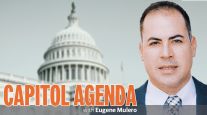Senior Reporter
Former Secretary Ray LaHood’s Roadmap for an Infrastructure Plan
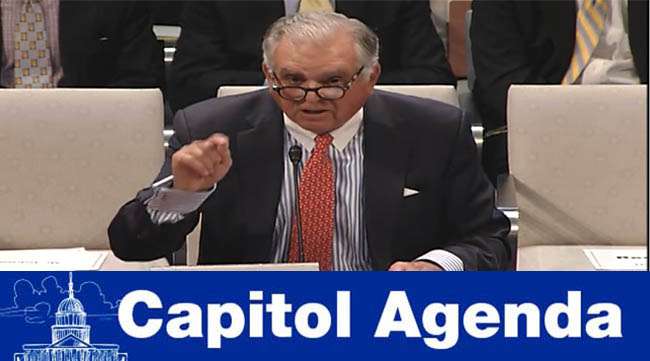
With the Senate Commerce panel set to take its first step in the 116th Congress to address freight infrastructure needs, it’s worth reviewing the advice Ray LaHood offered last week to the transportation committee in the House.
On Feb. 7, LaHood, the former congressman from Illinois and President Barack Obama’s first secretary of transportation, articulated a four-step process for advancing a plan in the House that would fix the America he calls “one big pothole.”
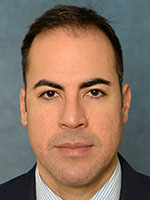
Mulero
“I think the timing is absolutely perfect. I think the stars are aligned for a big infrastructure bill. It’s gotta be big, and it’s gotta be bold,” LaHood told T&I. “The American people are waiting.”
Step 1: Come to grips with the reality that a sustainable source of money is needed to ensure funding for the construction and maintenance of infrastructure programs. Then, consider supporting at least a 10-cent fuel tax increase indexed to inflation. If there’s agreement for a 25-cent increase, as President Donald Trump is said to have suggested last year, then “hooray,” LaHood said. “Think of it as a jobs bill.” The legislation also must prioritize safety.
Step 2: Send a bill to the tax-writing Ways and Means Committee, which has jurisdiction over the Highway Trust Fund. The account, as you know, relies on dwindling revenue from the 24.4-cents-per-gallon diesel tax, and 18.4-cents-per-gallon gas tax. (Radioactive politics regarding taxes has discouraged Washington politicos from touching the fuel tax since Bill Clinton was in office.)
Step 3: During Ways and Means’ consideration of the first fuel tax increase since the early ’90s, complement the tax with alternatives such as public-private partnerships, tolls, and a vehicle-miles-traveled fee, for instance. “The issue is not knowing what to do,” LaHood explained. “The issue is how do we pay for it. Why hasn’t Congress passed an infrastructure bill? Because we can’t come to grips with the idea of how to pay for it.”
Step 4: Have the Senate agree with the House on a bill that would raise and index fuel taxes. Rush a final package to Trump’s desk for his signature. At the signing ceremony, smile for the cameras, and “Boom!” LaHood exclaimed. “America is back in the transportation business again. And we haven’t been in it for a long, long time.”
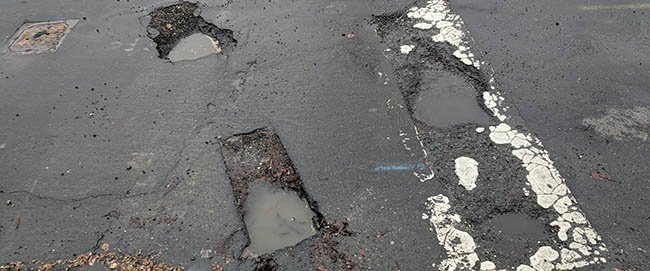
"One big pothole" is how former Transportation Secretary Lahood sized up the current condition of infrastructure in the United States. (Arlington, Va., Department of Environmental Services/Flickr)
The Week Ahead (all times Eastern)
Feb. 12, 10 a.m.: The House Science, Space and Technology Committee hosts a hearing titled, “The State of Climate Science and Why it Matters.” Witnesses will include Natalie Mahowald, engineering professor and faculty director for the environment at the Cornell University Atkinson Center for a Sustainable Future; Robert Kopp, director of the Rutgers Institute of Earth, Ocean and Atmospheric Sciences and professor at Rutgers University’s Department of Earth and Planetary Sciences; Jennifer Francis, senior scientist at the Woods Hole Research Center; Joseph Majkut, director of climate policy at the Niskanen Center; and Kristie Ebi, public health sciences professor and director of the University of Washington’s Center for Health and the Global Environment.
Spotlight Hearing
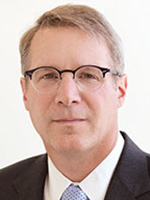
Spear
Feb. 13, 10 a.m.: Not to be outdone by their House counterparts, the Senate Commerce Committee intends to dive right into infrastructure matters with the heads of the country’s top freight associations. The committee’s leadership expressed an interest in determining immediate infrastructure needs to be able to, as they indicated, “keeping pace with a growing economy.” Look out for the partisan dynamics during the hearing, since the Green New Deal co-author and several 2020 presidential aspirants will press the witnesses on their views. Witnesses will include William Friedman, chairman of the American Association of Port Authorities; Ian Jefferies, president of the Association of American Railroads; Matthew Polka, president of the American Cable Association; Chris Spear, president of American Trucking Associations; and Larry Willis, president of the Transportation Trades Department.
Feb. 12, 10 a.m.: The Energy and Mineral Resources Subcommittee hosts a hearing on climate change.
Feb. 12, 10 a.m.: The Information Technology and Innovation Foundation hosts a panel discussion titled, “Moving America: How Policymakers Can Accelerate Automation in Freight Transportation.” Speakers will include Adrian Arnakis, senior vice president of government affairs at the Association of American Railroads; Thomas Jensen, senior vice president of transportation policy at UPS Inc.; and Suzanne Murtha, national lead for connected and automated technologies at AECOM.
Feb. 12, 2 p.m.: The Indigenous Peoples of the United States Subcommittee hosts a hearing titled, “The Impacts of Climate Change on Tribal Communities.”
Feb. 13, 8 a.m.: Axios hosts a panel discussion about technology and infrastructure featuring Sen. John Thune (R-S.D.) , Rep. Yvette Clarke (D-N.Y.), Mayor Andy Berke of Chattanooga, Tenn., and Gary Shapiro, president of the Consumer Technology Association.
Feb. 13, 10 a.m.: The National Parks, Forests, and Public Lands Subcommittee hosts a hearing on climate change.
Feb. 13, 10 a.m.: The House Transportation and Infrastructure Committee hosts a hearing titled, “Putting U.S. Aviation at Risk: The Impact of the Shutdown.”
Feb. 14-16: The Democratic National Committee scheduled its winter meeting.
Mood Swings
A lively debate during a House hearing Feb. 7 meant to kickoff infrastructure talks on Capitol Hill potentially inspired policymakers to focus up on advancing a long-term measure this year.
In Case You Missed It
Green New Deal? Bill Scher is not impressed.
Who’s New
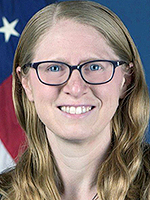
Lew
Shoshana Lew’s meteoric rise in the transportation community reached a high note earlier this month after the Colorado Senate gave unanimous approval to her nomination to lead the state’s Department of Transportation. Lew put in almost two years as Rhode Island’s DOT chief operating officer, and before that she was chief financial officer and assistant secretary for budget and programs at U.S. DOT, during the Obama administration. She began her career as an analyst at the Brookings Institution’s Metropolitan Policy Program.
 Buzz
Buzz

We’ll soon learn the ranking of the country’s worst freight bottlenecks. A key annual report will be unveiled shortly.
Favorite Video
New World Order: Art imitating life.
Favorite Tweet
The Funkmaster Flex of Infrastructure
Very excited to be joining Brookings Institution as a Nonresident Senior Fellow. This country really needs a good, robust infrastructure conversation, and @BrookingsInst is a great partner.
https://t.co/f7K16lviCO — DJ Gribbin (@dj_gribbin) February 6, 2019
The Last Word
You asked me the question, ‘Is a shutdown entirely off the table?’ The answer is no.
Acting White House Chief of Staff Mick Mulvaney on Feb. 10 on Meet The Press.
We publish weekly when Congress is in session. E-mail emulero@ttnews.com with tips. Follow us @eugenemulero and @transporttopics.



